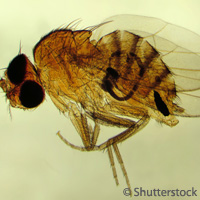How smell and food odours influence fruit fly courtship
The release of sex pheromones helps creatures attract mating partners, providing information on species and gender and on how receptive a potential mate is to the courtship. New European research shows how in Drosophila melanogaster, the common fruit fly, the males exhibit and control typical reproductive behaviours towards females thanks to a transcription factor called Fruitless (fruM). The findings demonstrate that an olfactory receptor for food-derived odours gives male courtship in Drosophila a boost. The results are presented in the journal Nature and are funded in part by the OLFPERCEPT ('Neural basis of olfactory perception in drosophila') project, which has received a European Research Council (ERC) Starting Grant of EUR 1.75 million under the EU's Seventh Framework Programme (FP7). Researchers from the Centre des Sciences du Goût et de l'Alimentation (CNRS/Université de Bourgogne/INRA), in cooperation with colleagues from Switzerland and the United Kingdom, observed how the smell of food acts as an aphrodisiac for these vinegar flies. According to them, male flies use a scent, generated by the fruit they consume, to stimulate their sexual appetite. Phenylacetic acid, a molecule linked to food-derived odours found in fruit, flowers and honey, attaches itself to a specific olfactory molecular receptor (IR84a) located on the antennae of the male fruit fly. Detection of this scent by this specific receptor effectively activates around 30 specific neurons, thereby setting off a defined neuronal circuit resulting in intensified sexual arousal of the male fly. 'Our results suggest a model in which IR84a couples food presence to the activation of the fruM courtship circuitry in fruit flies,' the authors write in the paper. 'These findings reveal an unusual but effective evolutionary solution to coordinate feeding and oviposition site selection with reproductive behaviours through a specific sensory pathway.' The IR84a keeps the sensorial neurons permanently active, regardless of whether odour is present or not. This keeps male flies on 'standby', so to speak, ready to attract a female partner. The researchers explain that the more 'perfumed' the partner, the more attractive they will be. This leads to a boost in the insect's sexual arousal. The team substantiated this by genetically deleting the expression of the receptor that decreases the sexual activity of the male flies (both with and without 'perfume'). They add that this olfactory perception mechanism plays a critical role in fruit fly species in the wider sense. It should be noted that offspring in particular benefit from the mating of adults near food sources. More research could lead to the discovery of similar mechanisms in other animal species.For more information, please visit:Centre des Sciences du Goût et de l'Alimentation (CSGA):http://www2.dijon.inra.fr/csga/Nature:http://www.nature.com/
Countries
Switzerland, France, United Kingdom



